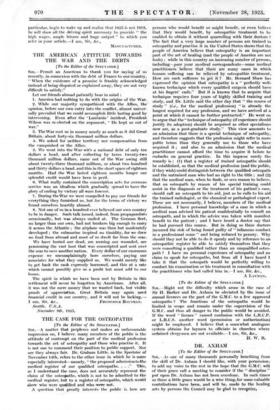THE CASE FOR THE OSTEOPATHS [To the Editor of the
SPECTATOR.] Sin,—A matter that perplexes and makes an unfavourable impression on, I believe_ many members of the public is the attitude of contempt on the part of the medical profession towards the art of osteopathy and those who practise it. It is not one to commend their position to public support. Nor are they always fair. Dr. Graham Little, in the Spectator of November 14th, refers to the other issue in which he is mere especially interested—namely, the proposed admission to the medical register of our qualified osteopaths. . . ." This, as I understand the case, does not accurately represent the claim of the osteopaths, which is not to be admitted to the medical register, but to a register of osteopaths, which would show who were qualified and who -were not.
A question that greatly interests the public is how are
persons who would benefit or might benefit, or even believe that they would benefit, by osteopathic treatment to be enabled to obtain it without quarrelling with their doctors ? The fact that a very large number of persons are trained in osteopathy and practise it in the United States shows that the people of America believe that osteopathy is an important part of the art of healing (and the people of America are not fools) ; while in this country an increasing number of persons, including—pace your medical correspondents—some medical practitioners believe that there are many cases in, which human suffering can be relieved by osteopathic treatment. How are such sufferers ^ to get it ? Mr. Bernard Shaw has eXpressed the opiniOn that -osteopathy is a " perfectly well. known technique which every. qualified surgeon should have at his fingers' ends." But it is known that to acquire that technique requires four years of highly skilled training and study, and. Dr. Little said the other day that " the course of study " (i.e., for the medical profession) " is already the longest required for any profession, and we have arrived at a point at which it cannot be further protracted." He went on to argue that the" technique of osteopathy (if experience should justify its adoption) should be acquired as other specialisms now are, as a post-graduate study." This view amounts to an admission that there is a special technique of osteopathy, and therefore suggests that the profession might refer in more polite terms than they generally use to those who have acquired it ; and also to an admission that the medical practitioner cannot afford the time to acquire it before he embarks on general practice. In this impasse surely the
remedy (1) that a register of trained osteopaths should be established, so that the medical profession (and the public, if they wish) could distinguish between the qualified osteopath and the untrained man who had no right to the title ; and (2) that the medical man, when he finds, or sees reason to believe, that an osteopath by reason of his special training could assist in the diagnosis or the treatment of his patient's case; should call an osteopath to his aid, just as he calls to his aid the trained radiologist, or the chemical or pathological expert. These are not necessarily, I believe, members of the medical piofession. I have personal knowledge of a case in which a medical man advised his patient confidentially to consult an osteopath, and in which the advice was taken with manifest benefit to the patient ; and I have heard a doctor say that he had pursued this course. But in doing so these doctors incurred the risk of being found guilty of " infamous conduct in a professional sense " and being reduced to penury. Why should they not be able to do it openly and byreference to an osteopathic register be able to satisfy themselves that they were consulting a qualified rather than an unqualified osteo- path ? I have no personal experience of osteopathy and no claim to speak for osteopaths, but from all I have heard I take it that the osteopath would be perfectly willing to conduct his examination or his treatment in consultation with the practitioner who had called him in.---I min, Sir, &c., - A LAYMAN.






















































 Previous page
Previous page